- Home
- Elizabeth Bear
Grail jl-3 Page 2
Grail jl-3 Read online
Page 2
Everyone knew to leave the Captain alone while she was swimming. Even the Angel.
So when Nova’s voice broke through her reverie—not so much a sound carried by vibration as a tickle in Perceval’s awareness, urgent with latent information—Perceval felt the sting of adrenaline through every vein.
The contact unfolded, expanding from a shimmering thread to a landscape of information. Perceval quit stroking forward, allowing the buoyancy of her body to carry her to the surface. She did not bob up as she once would have. Hollow bones served no purpose in a girl with no wings, and now she was stronger and heavier than ever she had been when she was a flyer.
As she broke the surface, her head came back, mouth open, lungs expanding her deep chest as she filled herself with air. Her body—flesh and symbiotic colony—took care of that automatically. Which was as well, because Perceval’s awareness was half a hundred miles away, spun out through the fabric of motes, colonies, and electromagnetic webs that made up the ramscoop and nervous system of the Jacob’s Ladder.
The world was braking sharply through the gravity well of the first stellar system she had encountered since leaving the shipwreck stars the better part of fifty years before. Perceval bestrode the vast construction-toy webwork of the world’s frame—its spokes and wires and the baubles of habitats strung between them—and she watched the distant stars turn in the cold dark on every side.
Only one, the destination sun, was close enough to seem warm, and even it was but a brighter mote, alight on the Enemy’s black bosom. Somewhere between here and there lay the potentially habitable world—with its massive satellite—that they had come to colonize.
Astrogator Damian Jsutien, who had plotted their course, relying on information gleaned from an alien prisoner, had taken to sardonically calling it Grail, and the name had stuck.
Perceval’s crippled artificial world was limping to drink from a healing cup. The creature—Leviathan—that had given them the data on where to find this planet had also almost destroyed the Jacob’s Ladder. And given what the Jacob’s Ladder, in the person of Cynric, had done to Leviathan—enslaving it, creating symbiotic nanocolonies from the corpse of its mate—Perceval did not blame the monster for waging war on them.
Perceval found herself conflicted. This—the Jacob’s Ladder, the world she had been trying to teach herself to think of as only a ship, only a temporary haven until they found some planet full of trees and rocks and oceans and solid, reliable gravity that nobody ever had to twiddle with—this was all she’d ever known. The Jacob’s Ladder had brought Perceval and her people all this way, through the claws of the cold and cunning Enemy, even though she had been designed by the treacherous Builders to fail and kill them.
The Jacob’s Ladder had borne Perceval and her family through coups, wars, and internal conflict. Through the civil war waged between Perceval’s aunt, Ariane Conn, and the fallen-Angel remnant of an artificially intelligent library, Jacob Dust, that had left Perceval Captain. It seemed somehow disloyal now to contemplate abandoning her.
Perceval was about to protest Nova’s interruption of her recreation—they weren’t scheduled to make orbit for several thousand hours—but in that instant she recognized the object that had gotten caught up in the Jacob’s Ladder’s ramscoop and retrieved by alert drones before it could feed the maw of the world’s engines. It was a spiky, fragile, sensorladen probe with copper-colored solar wings slightly crumpled by its rescue. Something made by intelligent life.
“Somebody lives here,” she said. “Somebody intelligent enough for space flight already lives on Grail.”
Somebody who uses Arabic numerals and the Roman alphabet, Nova said inside her head, and rotated the perspective to show her the markings on the probe’s flanks, between the solar wings. Somebody who got here first.
“Oh,” she said. “This is going to start another fucking civil war, if we’re not careful. The Go-Backs are not going to love this.”
The bright particle winds of a star caressed his sleeping awareness. The long, deepening slope of a gravity well dropped away under him and, as his program demanded, he awakened.
Reawakened.
The body they gave him was broken. A crimped and crooked thing, not so much discarded by the small pseudo-life that had inhabited it as shattered beyond that life’s capacity to repair. But him—he was stronger than the remnant, and he displaced it with ease. He limped into its cramped spaces like a wind into a cavern, so constrained by its limits that even his shredded self would not entirely fit and still more rags and tendrils had to be shed, cut away by the Procrustean limits of this metaphysical form.
It had fallen far, this construct. Literally and figuratively. And so had he.
But it was a body. It was a beginning. He was a seed. He could grow.
What had been Dust awakened in darkness, a monster. And there at the bottom of the world, he began to plot his revenge.
Caitlin Conn was a lousy liar. In her father’s house, refusing to learn to lie had been a rebellion, and under those circumstances the small rebellions kept one sane. You asserted any control you could; you defended any part of your identity that you could own. Lying would have been safer; it would have diverted Alasdair’s attention.
Being a truth-teller set her apart. She had learned the trick from her oldest full sister, Caithness, who was also the least impressed with the pathologies of personality that made up Alasdair Conn. Caithness had been possessed of a sense of honor as quirky as it was unbending, and it had been the death of her. Caitlin suspected that she herself had escaped with only exile in large part because Alasdair considered her Caithness’s smaller, paler shadow—a kind of inferior copy of his admired and hated child.
Once Alasdair killed Caithness and exiled Caitlin, the lousy lying and the brusque disregard for politics and manipulation had only solidified in her character. What had been defiance was now a memorial; what had been a guarded border became a refuge. Caitlin had succeeded fairly well in her chosen field. She was Chief Engineer, after all, and acknowledged liege of Engine—despite her refusal to play politics.
Or to placate her father.
But the one she loved had not allowed himself to be swayed by such qualms. Together, she and Benedick had created a daughter—and thinking of Perceval now, Caitlin felt they had done quite well in that regard. But Benedick had also agreed to father a child on Arianrhod, for reasons of negotiating peace through hostage-sharing, and that Caitlin had been unable to abide.
They had barely spoken for fifteen years, and only the mortal peril engendered by the Angel Dust’s interest in their daughter had brought them back into alliance again. And now—
Now Perceval was Captain of the Jacob’s Ladder, and Caitlin was still Chief Engineer, and Benedick—Benedick was a man who had lost one daughter, and would do anything to defend the one who remained. Caitlin found it hard to reconcile her own anger and grief—for she, too, had been fond of Rien—with any forgiveness for Benedick. She knew some of her wrath was because she loved him. When we love, it is hard to forgive the beloved for not being the person we imagined them.
But he was also one of Caitlin’s greatest resources when it came to the running of the reborn Jacob’s Ladder—no longer a world but now a starship again. Tension between them was insupportable.
And Caitlin did not have the skills to lie to him about her feelings. Or the desire to learn how. There was nothing else to be done.
They were going to have to have A Conversation.
* * *
She went to find him in person, seeking for some time through the only slightly populated corridors of Engine until she found him working below the environmental services level in one of the adaptive maintenance microclimates. She could have asked the ship where he was, but there was always the chance that Nova would pass along her interest, and though the weakness shamed her, she craved the advantage of surprise.
She got it. The moss-carpeted floors and lichen-hung beams of the glen softened
her footsteps beyond the hearing of even Exalt ears, and Benedick was invisible to the waist inside the bole of a symbiotic filtration tree. The world requires an awful lot of maintenance.
He was working with a toolkit—not the one that had been lost when Arianrhod tried to kill him and Chelsea so many decades ago, but a smoke blue one with long, grasping fingers adapted as holders and pullers. Caitlin watched his hand emerge from inside the tree, hanging out a rack of filters for the toolkit to lick clean, and when he would have collected the replacements she brushed his fingers.
The thump and startle from inside the bole were vividly audible. Caitlin winced even as she grinned. Cursing under his breath, Benedick telescoped out of the tree, shaking sap and cobwebs from his straight, black hair. “We’re both lucky I wasn’t armed,” he said.
“So much for the catlike reflexes.”
He studied her from his greater height, wiping his hands and face on a rag the toolkit offered. “To what do I owe the pleasure?”
He didn’t even think the word dubious, as far as Caitlin could tell from inspecting his expression. Which made him, right there, a better person than she.
“We need to talk,” she said. “About your daughters.”
He glanced aside, finding a branch to drape the rag over, careful not to disturb the banners of Spanish moss and air-plant that grew there. “You have plenty of reasons to be angry with me,” he said. “I’ve never denied that. Is this about something else this time?”
As long as she was looking up at him, she decided, she might as well take a load off. The filtration tree had a number of low, louvered branches that arched comfortably for sitting. She hooked a leg over one at waist height and slid herself onto it, leaning back on the curve of the branch as if into an armchair. “I guess I want to understand,” she said. “What did you think could be achieved by placating him? By giving him a means of controlling you?”
He blew his bangs out of his eyes and plunked down on the moss, giving her an advantage. She wondered if he didn’t think he’d need it, or if he was capitulating preemptively. “I thought it would make him feel safer,” he said. “You know how many of the evils he was driven to were motivated by fear. You know how brutal Gerald was—”
I don’t believe you’re still making excuses for the old bastard! But as she opened her mouth to say it, she somehow managed to choke back her temper. Reasons were not excuses, and she had asked. Punishing Benedick because she didn’t like his honest answers got them no closer to healing.
“I know,” she said.
Benedick rubbed his palms across his long face, smearing the skin and stretching his eyes out long and crooked. He let his hands fall and looked at her, the monster countenance vanishing back into the lined features of a familiar man. “Caithness scared him more than anything. I wanted to give him a sense of control; he was always better when he felt he had control.” He sighed. “I was wrong. I made mistakes. There’s only so much culpability I can admit to.”
She looked down at her hands. This was harder than she had imagined, rehearsing it in her head. It wasn’t a lie; she had to believe it. “We all made mistakes,” she said. “I wanted you to fight him more, to be more like Cate. But you’re here and she’s not, and I’m here, and—” She shrugged. “I’m ready to put the mistakes away.”
He was silent a long time, but she could hear him breathing as his chin sank down to his chest. Thinking; considering. She knew the posture. He was phlegmatic by nature. When he finally spoke, it was slowly. “I’m not sure I’m ready for your forgiveness.”
She shook her head. “I’m not sure I’m ready to offer it. But I also know we have too much to worry about, and we need each other too much, for me to hang on to that anger. So I’m working on it, okay?”
She held out her hand. He stared at it for a moment before, tilting his head in acquiescence, he took it and they helped one another to stand.
It wasn’t too many days later when, sitting across the breakfast table from her, Benedick Conn remembered beheading his other sister.
Benedick’s flesh, and his colony, were replete with recollections that he would have preferred to erase, undo, or lose forever. Human memory was fragile, malleable. Merciful. It had a tendency to protect the rememberer from the worst excesses of his own guilt or folly. Benedick was a bred eidetic, but even that eideticism was imperfect knowledge contained in flesh, vulnerable to conflation, confabulation, and plain, old-fashioned forgetting.
Machine intelligence was not so clement. It was precise and perfect, photographic. Unforgiving. But it could be edited by choice, and that was the temptation that Benedick found himself doing battle with more often than he cared to admit. Because, while the memories might be painful, it seemed wasteful to sacrifice the experience hard-won through that pain in the name of comfort or self-respect.
Cynric and he were not alone in the small spare room, cramped around a transparent table littered with fixings for a hasty first-watch meal. Their sister Caitlin Conn, the Chief Engineer—and the (estranged) love of Benedick’s life—stood at the front wall. To Benedick’s left was the Astrogator, Jsutien, and on beside him, passing him notes on her slate, was another sister—the youngest, Chelsea.
The Captain, Benedick’s daughter Perceval, and the First Mate, his brother Tristen, were available by remote, but not currently engaged in the conversation. They had their own problems.
Benedick lifted the table knife and dipped it in olive oil spread, which melted to herbs and oleaginousness on contact with warm lentil-flour bread. It was a metal handle with a flat blade attached, small and unthreatening. But his hand closed on the knife as if around the hilt of a sword—the sword he had wielded to execute his sister. The sensory memory was vivid and sharp—the weight of Mirth in his hand, so unlike the non-presence of an unblade, which had seemed appropriate. An unblade would have killed with no feeling of contact as the sword parted bone and flesh, but there should be resistance when a life ended. The resilience of flesh, the density of bone.
It should be harder to kill someone. The ease of unblades made their purpose somehow more terrible.
So he had chosen Mirth, which was not an unblade at all. And considerably safer. Unblades, engines of entropy that they were, required fanatical care in handling and training if they were not to be more of a danger to their wielder than her enemy.
Though Cynric the Sorceress had begged for the favor of her death at his hand, he understood now that it had all been pursuant to her master plan and that the death hadn’t been quite … permanent. Something was lost in translation, surely, when machine memory alone remained, patterned electricity without chemical context. But he hated it when Cynric came back to Engine, when he was forced to remember killing her—with memories of flesh and memories of silicon.
Benedick found irony in his knowledge that the symbiont Cynric herself had created—and inoculated into Benedick by her own hand—was the very thing that allowed Benedick to remember her murder so precisely.
He watched her from the corner of his awareness, her hair as straight and long as his own, but paler—brown where his was black, her eyes gray-blue where his were hazel. She looked the same, but he knew she wasn’t. And he hated how she had changed, and how he could see the core seed of who she had been repopulating the corners of her mind in configurations that were similar to but not the same as those of the woman he had known. He hated knowing that his own actions had been instrumental in pruning her back so brutally, whether by her consent or request.
Perhaps if she visited more often, he would be over it by now.
But she didn’t seem to be paying him any attention. Her hawklike profile was bent over the breakfast table as she dripped honey into her tea, the green sapphire stud in her nostril glinting through the dark, loose strands. A scholar’s robe of white and green drooped from her shoulders and draped her thin arms. She was as skinny as his daughter Perceval.
Benedick sighed silently. For the moment he, too, forced himself to fo
cus on his bread and tea, and the words of Caitlin Conn.
“We would have expected more significant radio flux from a world inhabited by intelligent life.” Caitlin had an educator’s tones. “We would have expected to see them coming—or see them while coming at them. If we’d been expecting other people here, we could have arrived sneakily, or loudly broadcasting our good intentions. But based on the probe we recovered, they seem to rely on some form of tight-beam transmissions that we do not fully understand. We are continuing our analysis.”
“They are definitely human?” Chelsea asked, rolling crumbs of bread between her fingertips. It took courage to ask the obvious question.
“Definitely,” Caitlin said. “The markings on the probe are in an alphanumeric system derived from our own. And my engineers believe their machinery springs from the same roots, though we have undergone centuries of technological drift.”
Cynric sipped her tea. “I am engineering a device to receive and decode them, but these things take time.”
They must be spliced, they must be hybridized. They must be grown to parturition and to enough adulthood to be useful. Even in Cynric’s hands, that might mean days. Weeks.
Cynric licked at the edges of her teeth. “What other signs of life does Grail possess?”
Caitlin was shorter and more compact than Cynric—or Benedick, for that matter. It was from him that Perceval got her rangy build, while Caitlin had broad shoulders and a solid frame. Her auburn hair curled loosely about her nape and ears, cut too short to brush her collar. She had gray-blue eyes, the whites flushed with the pale cobalt tint of her colony, and she favored bright, warm colors—currently, a loose-sleeved tunic in flowing vermilion over a body-tight shirt in a complementary yellow.
When she turned to Cynric, she caught Benedick’s gaze along the way and offered a small, sympathetic smile. He let out the breath he was holding. Time and useful work were healing those wounds, at least.

 Scardown
Scardown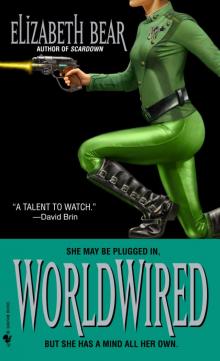 Worldwired
Worldwired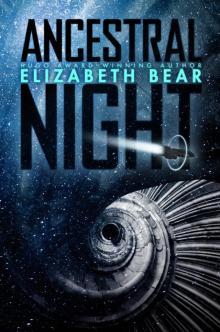 Ancestral Night
Ancestral Night Hammered
Hammered The Red Mother
The Red Mother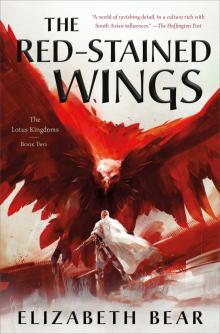 The Red-Stained Wings--The Lotus Kingdoms, Book Two
The Red-Stained Wings--The Lotus Kingdoms, Book Two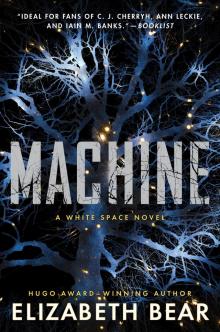 Machine
Machine Some of the Best from Tor.com: 2019 Edition
Some of the Best from Tor.com: 2019 Edition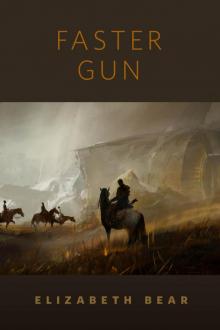 Faster Gun
Faster Gun In the House of Aryaman, a Lonely Signal Burns
In the House of Aryaman, a Lonely Signal Burns Stone Mad
Stone Mad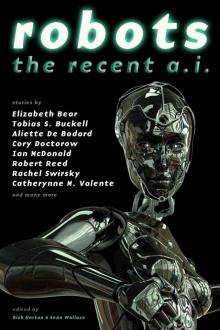 Robots: The Recent A.I.
Robots: The Recent A.I. The Tempering of Men
The Tempering of Men Boojum
Boojum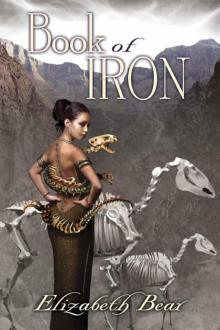 Book of Iron bajc-2
Book of Iron bajc-2 The Year's Best Dark Fantasy and Horror, 2010
The Year's Best Dark Fantasy and Horror, 2010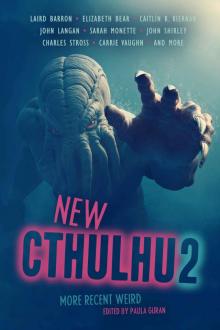 New Cthulhu 2: More Recent Weird
New Cthulhu 2: More Recent Weird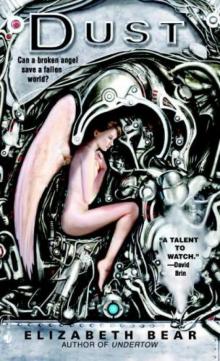 Dust jl-1
Dust jl-1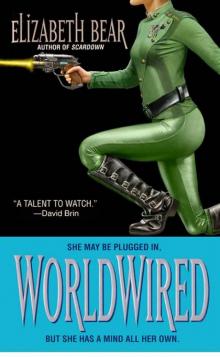 Worldwired jc-3
Worldwired jc-3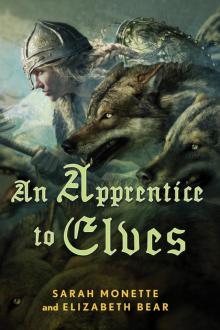 An Apprentice to Elves
An Apprentice to Elves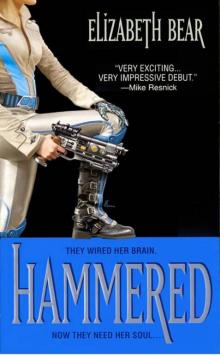 Hammered jc-1
Hammered jc-1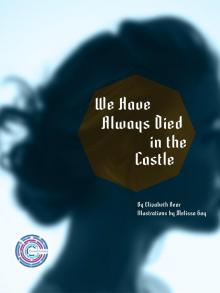 Crowd Futures: We Have Always Died in the Castle
Crowd Futures: We Have Always Died in the Castle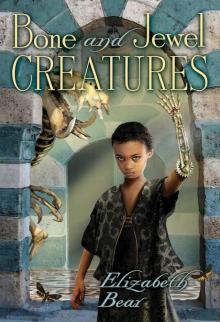 Bone and Jewel Creatures bajc-1
Bone and Jewel Creatures bajc-1 Carnival
Carnival Some of the Best from Tor.com: 2012 Edition: A Tor.Com Original
Some of the Best from Tor.com: 2012 Edition: A Tor.Com Original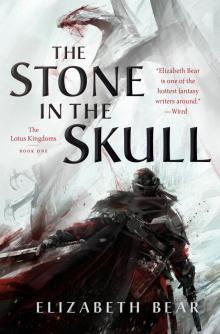 The Stone in the Skull
The Stone in the Skull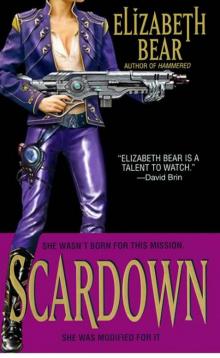 Scardown jc-2
Scardown jc-2 Hell and Earth pa-4
Hell and Earth pa-4 Undertow
Undertow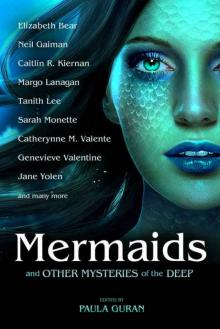 Mermaids and Other Mysteries of the Deep
Mermaids and Other Mysteries of the Deep A Companion to Wolves
A Companion to Wolves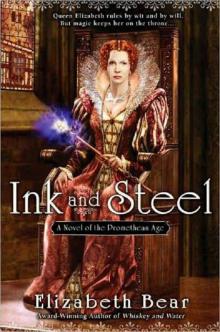 Ink and Steel pa-3
Ink and Steel pa-3